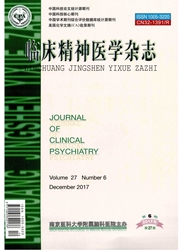

 中文摘要:
中文摘要:
目的:探讨抗抑郁药配合归因治疗对抑郁症患者生活质量的改善程度及动态变化。方法:对32例抑郁症患者(研究组)采用抗抑郁药配合归因治疗,分别在治疗前、治疗期间及治疗12周评定24项汉密尔顿抑郁量表( HAMD);在治疗前、治疗12周、24周及36周评定生活质量综合评定问卷(GQOLI-74)。32名正常对照组评定 GQOLI-74。结果:研究组治疗后症状明显改善。治疗后两组生活质量比较,除婚姻与家庭因子,其余各指标差异均无统计学意义(P 〉0.05)。研究组除性功能因子及婚姻与家庭因子,其余各指标随治疗时间均有显著改善(P 〈0.001)。结论:抗抑郁药配合急性期归因治疗不仅能有效缓解抑郁症患者的症状,使其生活质量恢复到正常水平,而且能在治疗结束后对生活质量的改善持续发挥作用。
 英文摘要:
英文摘要:
Objective:To explore the extent to which quality of life in depressive patients improved by combining antidepressants with attribution therapy and its fluctuation. Method:Thirty-two depressed patients were enlisted in study group( antidepressants + attribution therapy)and they were measured with 24-item Hamilton depression scale and 74-item general quality of life inventory(GQOLI-74)periodically. 32 volunteers were recruited in normal control group and measured with GQOLI-74. Results:Symptoms of study group were remitted significantly. In the factors of GQOLI-74,there was no significant difference without marriage and family factor between two groups after the therapy. In study group,all the factors but sexual function and marriage and family were found to have extremely significant difference in each time spots and overall trend(P 〈 0. 001). Conclusion:Antidepressants combined with attribution therapy can improve depressive patientsˊ symptoms and quality of life and the improvement lasts long.
 同期刊论文项目
同期刊论文项目
 同项目期刊论文
同项目期刊论文
 Attributional retraing group therapy versus selective serotonin reuptake inhibitors: neurobiological
Attributional retraing group therapy versus selective serotonin reuptake inhibitors: neurobiological Comparison of the neurobiological effects of attribution retraining group therapy with those of sele
Comparison of the neurobiological effects of attribution retraining group therapy with those of sele 期刊信息
期刊信息
